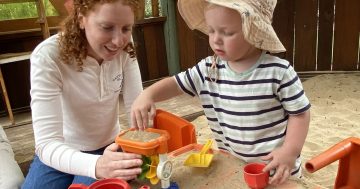
School, mental health and relationship challenges were the three main personal challenges identified by teenagers in the ACT. Photo: File.
Less than half of 15 to 19-year-olds in the ACT felt positive about their future, a study of teenagers revealed.
The environment, discrimination and financial difficulties topped the list of issues young people were most concerned about, according to Mission Australia’s 2023 Youth Survey.
The survey also found school was the biggest personal challenge faced by ACT teenagers, with more than a third planning to take a gap year after finishing their studies.
Overall, 45.1 per cent of young Canberrans said they felt positive or very positive about the future, compared with the national average of 50 per cent.
While the environment remained the issue of most concern to young Canberrans, the focus has shifted slightly in this year’s survey to reflect the impact of cost of living pressures.
The survey found young people in the ACT were increasingly worried about their financial situation; 34 per cent of respondents identified the economy and financial matters as one of the most important issues in Australia, up from 26 per cent in 2022 and 14 per cent in 2021.
“The biggest challenge for me has been having financial issues within the family,” a 15-year-old Canberran told the survey.
“We weren’t able to pay bills, fuel, food etc. So I picked up extra shifts whenever I could because of this. My pay was used for the above as well as my parents’ pay.”
Mission Australia state director for the ACT Nada Nasser said this wasn’t an issue unique to Canberra.
“The economy and financial stress… we’re seeing a significant increase across the board, not only the ACT,” she said.
“It’s not surprising given the cost of living crisis and housing crisis. Young people are feeling it, and are certainly telling us.”
Although 47 per cent of respondents identified the environment as one of their main concerns, this has fallen from 61 per cent in 2022.
Ms Nasser said the change was likely due to the economy and financial matters “taking a bit more of a focus of attention”.
“I think a bit of that focus has shifted, we see that not only among young people but across Australia,” she said.
Nevertheless, 25 per cent of young Canberrans said they were extremely or very concerned about climate change.
In terms of personal challenges, 45 per cent of respondents said school was the biggest issue they faced.
This comes as a recent ANU study found Year 10 students in the ACT were among the worst affected by pandemic lockdowns.
“I have tried so much to put my best effort in all my school studies, still I do not get the marks I predicted,” a 17-year-old told the Mission Australia study, adding this had been the case for the past two or three years.
“I feel like I have got so much pressure in completing my senior studies.”
Another respondent cited a challenging workload.
“School has been a huge challenge for me this past year,” a 16-year-old Canberran told the survey. “The workload is overbearing.”
The survey also found 35.9 per cent of respondents said they planned to travel or take a year out after they finished their studies, while 63.8 per cent said they planned to go to university.
Mental health and relationship challenges were other issues identified by teenagers in the ACT.
While there were often preconceptions young people were not conscious of wider issues in society, Ms Nasser said the results of the study showed this wasn’t the case.
“Young people are aware, they are politically active, they really do care about issues,” she said.
“The importance of this survey is listening to young people and ensuring we embed the voices of young people in programs and policies.”
“They want to be part of the decision-making process.”





















